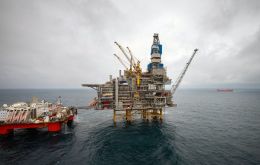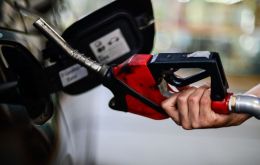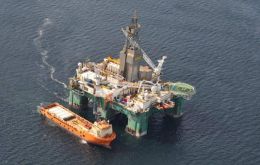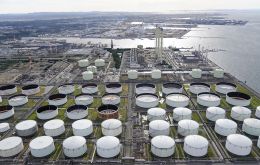MercoPress. South Atlantic News Agency
Energy & Oil
-
Tuesday, March 15th 2022 - 09:37 UTC
PM Johnson hosted a roundtable of leaders in the UK’s offshore oil and gas industry

Prime Minister Boris Johnson hosted on Monday a roundtable of leaders in the UK’s offshore oil and gas industry today to discuss domestic energy security. This is part of a series of engagements by the Government across the UK’s energy sectors, including with renewable and nuclear companies in the coming days and weeks.
-
Monday, March 14th 2022 - 20:42 UTC
Fuel at Argentine pumps goes up for the second time this year

Argentina's state-run oil company YPF has increased its prices at pumps between 9.5% and 11.5%. It was the second rise this year. Other brands such as Shell have followed suit. The last increase had been in February.
-
Friday, March 11th 2022 - 09:35 UTC
Duque tells Biden Colombian crude available if needed

President Iván Duque has made Colombian oil available to the United States if the Joseph Biden administration needs to stabilize global energy prices following Russia's military operations in Ukraine, it was announced in Bogotá Thursday.
-
Friday, March 11th 2022 - 08:41 UTC
Petrobras increases price of fuel for distributors after 57 days

Brazil's Petrobras has increased the price of refined gasoline and diesel for distributors as of March 11. The average price has gone up to R$3.86 (US$ 0.77) for regular fuel and R$4.51 (US$ 0.9) for diesel.
-
Saturday, March 5th 2022 - 09:54 UTC
Falklands exploration company raising funds to appraise and develop a gas condensate discovery

Borders & Southern Petroleum PLC said on Friday that it intends to conduct fundraising of up to US$1.8 million to appraise and develop its Darwin gas and condensate discovery in the Falkland Islands.
-
Friday, March 4th 2022 - 09:10 UTC
YPF Luz officially opens Cañadón León wind farm in Argentine Patagonia

Argentina's YPF Luz - the electricity division of the traditional state-owned oil company - has officially opened its third wind farm, Cañadón León, which is expected to supply 123 MW of renewable energy to the national system, it was reported Thursday.
-
Wednesday, March 2nd 2022 - 09:36 UTC
US and allies agree to release 60 million barrels of their oil reserves

The United States and allies will be releasing 60 million barrels from their reserves, in an effort to contain the effect on supply and prices of the Russian invasion of Ukraine. Thirty million will come from the US Strategic Petroleum Reserve and the other half from allies in Europe and Asia.
-
Wednesday, March 2nd 2022 - 09:03 UTC
Major oil companies, Shell, BP, Equinor exiting interests in Russia

Shell joined BP in announcing it will leave all its Russian operations, including a major liquefied natural gas plant, following on Moscow's invasion of Ukraine. Earlier BP also abandoned its share in Russian oil giant Rosneft, a move that could cost the British company over US$25 billion.
-
Wednesday, March 2nd 2022 - 07:07 UTC
Nord Stream 2 pipeline builder files for insolvency and leaves staff redundant

The Swiss company that built the Nord Stream 2 pipeline, supposed to double the Russian gas supply to Germany, has filed for insolvency and left redundant all its staff, according to Swiss radio SRF. The US$ 11bn pipeline, which runs between Russia and Germany, was completed last September and waiting for final approval from German authorities, but was put on hold following the Russian invasion of Ukraine.
-
Monday, February 28th 2022 - 20:20 UTC
OPEC+ meeting this week expected to increase another 400,00 bpd

The OPEC+ alliance is set to approve this week another 400,000 bpd increase in monthly production targets, despite the fact they have been supplying below the announced volume. Russia and OPEC's de facto leader Saudi Arabia manage the OPEC+ group, which has been running supply to the market since the beginning of 2017
